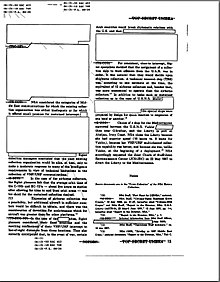
Classified information is material that a government body deems to be sensitive information that must be protected. Access is restricted by law or regulation to particular groups of people with the necessary security clearance with a need to know. Mishandling of the material can incur criminal penalties.
A formal security clearance is required to view or handle classified material. The clearance process requires a satisfactory background investigation. Documents and other information must be properly marked "by the author" with one of several (hierarchical) levels of sensitivity—e.g. restricted, confidential, secret, and top secret. The choice of level is based on an impact assessment; governments have their own criteria, including how to determine the classification of an information asset and rules on how to protect information classified at each level. This process often includes security clearances for personnel handling the information.
Some corporations and non-government organizations also assign levels of protection to their private information, either from a desire to protect trade secrets, or because of laws and regulations governing various matters such as personal privacy, sealed legal proceedings and the timing of financial information releases.
With the passage of time much classified information can become less sensitive, and may be declassified and made public. Since the late twentieth century there has been freedom of information legislation in some countries, whereby the public is deemed to have the right to all information that is not considered to be damaging if released. Sometimes documents are released with information still considered confidential obscured (redacted), as in the adjacent example.
The question exists among some political science and legal experts whether the definition of classified ought to be information that would cause injury to the cause of justice, human rights, etc., rather than information that would cause injury to the national interest; to distinguish when classifying information is in the collective best interest of a just society, or merely the best interest of a society acting unjustly to protect its people, government, or administrative officials from legitimate recourses consistent with a fair and just social contract.
- ^ "United States Cryptologic History: Attack on a Sigint Collector, the U.S.S. Liberty" (PDF). NSA.gov. Archived from the original (PDF) on 30 October 2012. Retrieved 14 November 2012.